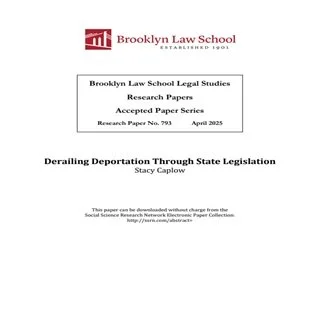By Stacy Caplow
Everyone agrees: Immigration law is in crisis. One aspect of immigration law is particularly intransigent: the impact of a criminal conviction on lawful permanent residents [LPRs]. In combination, immigration statutes and case law construct an almost inescapable box for LPRs whose movements, security, and liberty are threatened the moment they step into a criminal court. A conviction can prevent international travel, thwart naturalization, mandate detention and, worst of all, result in deportation. A conviction might cause problems at a port of entry, at a USCIS service center, at a prison or, most alarmingly, after an ICE knock on the front door years after the conviction and even the completion of the sentence. While the immigration consequences of a conviction are hydra-headed, the focus of this paper will be on LPRs facing removal who stand to lose “all that makes life worth living.”[1]
Sometimes the removal process moves on an express track—a predestined outcome with no possible relief. The more fortunate LPR may be able to delay, and a few may even avoid deportation, but all pay a steep fare of time, anxiety, uncertainty and often a loss of freedom. However long the trip or wherever its final destination, in many cases it is difficult or even impossible to justify the painful journey which may cause long term disruption, or ultimate exile from family, employment and community.
Scholars, legislators, and advocates have focused on the unfairness of many harsh immigration laws, but the search for solutions is frustrating given the unlikelihood of statutory changes at the federal level, particularly for noncitizens impacted by the criminal legal system. There have been many proposals and recommendations as well as a few notable initiatives, but these steps offer either imperfect or deficient protections for LPRs.
If federal law is intractable, what can give? This paper argues that state legislative initiatives provide opportunities to loosen the stranglehold of federal immigration law. Some states already have passed laws designed specifically to help immigrants avoid immigration consequences. These efforts to safeguard Lawful Permanent Residents from deportation could be adopted more widely or expanded to provide even more protections for any noncitizens caught in the criminal legal system.
Brooklyn Law School, Legal Studies Paper No. 793,


